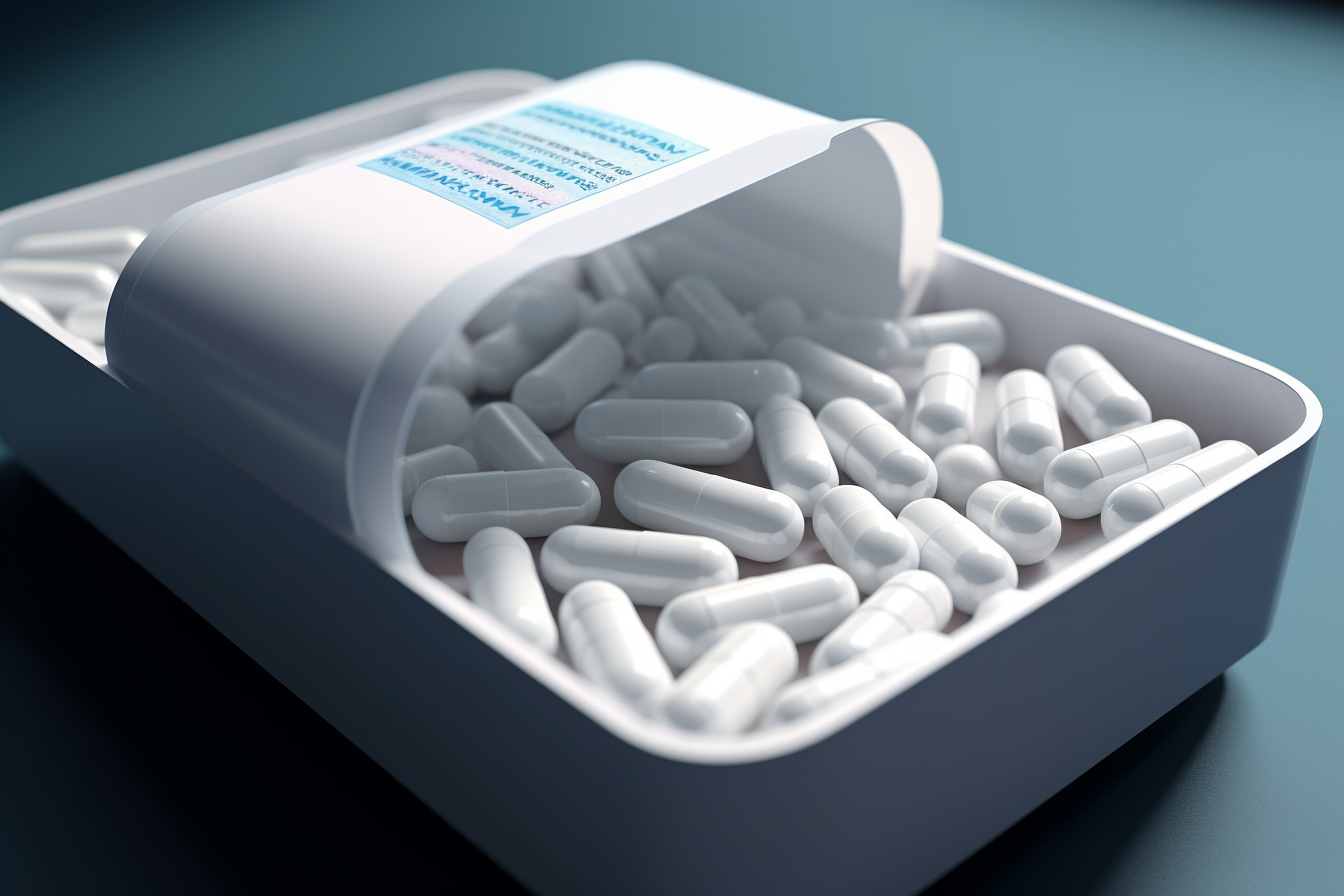In recent years, there has been growing interest in the relationship between GABA (gamma-aminobutyric acid) and depression. Depression, a common mental health disorder affecting millions worldwide, continues to challenge researchers and clinicians alike due to its complex underlying mechanisms. GABA, known as the brain’s primary inhibitory neurotransmitter, plays a crucial role in regulating neuronal activity and maintaining emotional stability. This article delves into the science behind GABA’s involvement in depression, exploring how alterations in its functioning may contribute to the development and progression of this debilitating condition. With an emphasis on understanding these intricate connections, we hope to shed light on potential avenues for novel therapeutic interventions targeting GABAergic dysfunction for better outcomes in individuals struggling with depression.
The Role of GABA in Depression: An Overview
The relationship between GABA (gamma-aminobutyric acid) and depression has garnered increasing attention in recent years. Depression, a prevalent mental health disorder with complex underlying mechanisms, continues to pose challenges for researchers and clinicians. As the brain’s primary inhibitory neurotransmitter, GABA plays a vital role in regulating neuronal activity and maintaining emotional stability.

This article provides an overview of the scientific literature investigating the involvement of GABA in depression, highlighting how dysfunctions in its functioning may contribute to the development of this debilitating condition.
GABA serves as an important modulator within the central nervous system by inhibiting excessive neural firing, thereby promoting calmness and reducing anxiety.
Dysregulation or imbalance of GABA levels have been consistently observed among individuals with depression, indicating its potential significance as a biomarker or therapeutic target.
Although there is still much to learn about specific mechanisms linking GABA abnormalities to depressive symptoms, research suggests that reduced availability or impaired signaling of GABA receptors may be implicated in depressed mood states.
Understanding the intricate interplay between GABA dysfunction and depression holds promise for advancing our understanding of this complex disorder while potentially informing new treatment approaches aimed at restoring proper functioning within these pathways. Further investigations into neurochemical underpinnings will undoubtedly shed light on novel strategies targeting GABAergic systems that could provide relief for those affected by depression worldwide.
Dysregulation of GABAergic System in Depression
In recent years, researchers have shown an increasing interest in understanding the connection between GABA (gamma-aminobutyric acid) and depression. Depression, a prevalent mental health disorder impacting millions globally, remains a complex challenge for scientists and clinicians due to its intricate underlying mechanisms. GABA, which serves as the brain’s primary inhibitory neurotransmitter, holds great significance in regulating neuronal activity and upholding emotional stability. This article primarily examines the scientific foundation supporting GABA’s role in depression, investigating how dysregulation of its function may contribute to the development of this debilitating condition.
GABA acts as a vital regulator of neuronal excitability within various regions of the brain implicated in mood regulation. Preclinical studies have consistently demonstrated altered levels or functioning of GABA receptors among individuals with depression symptoms compared to healthy counterparts. These findings suggest that abnormal modulation within the GABAergic system could play a significant role in contributing to depressive states. Consequently, exploring potential interventions targeting this particular neurotransmitter pathway represents a promising avenue for future research.
Moreover, emerging evidence has linked alterations in GABA metabolism with various psychiatric conditions including major depressive disorder (MDD). Imbalances involving enzymes responsible for synthesis or degradation of GABA have been observed among individuals with MDD when compared with those without this disorder. Such disruptions potentially disrupt neurotransmission processes related to emotion regulation and may ultimately influence vulnerability to developing depression.
Overall, understanding the dysregulation of the GABAergic system provides crucial insights into unraveling some complexities surrounding depression pathology. By uncovering these mechanisms associated with imbalances involving GABA production or receptor functioning, researchers hope to pave the way for novel therapeutic strategies aimed at restoring normal neurochemical balance and alleviating depressive symptoms more effectively.
GABA Receptors and Their Implications in Depressive Symptoms
GABA receptors, also known as gamma-aminobutyric acid receptors, are an important component in understanding the implications of depressive symptoms. As the brain’s primary inhibitory neurotransmitter, GABA regulates neuronal activity and emotional stability. Research has shown that abnormalities in GABA receptor functioning may contribute to the development and manifestation of depression.
Studies have demonstrated a link between reduced GABA levels or impaired GABA receptor function and depressive symptoms. It is hypothesized that this imbalance disrupts the delicate balance between excitation and inhibition in the brain, leading to dysregulation of emotion processing areas. Furthermore, alterations in GABAergic signaling pathways have been noted in individuals with depression, suggesting that targeting these pathways may hold therapeutic potential for managing depressive symptoms.
Understanding how GABA receptors are involved in depression can provide insights into potential treatment options for this debilitating disorder. Further research is needed to fully elucidate the complex role of GABAergic dysfunction in depression and to develop targeted interventions aimed at restoring proper functioning of these receptors.
GABAergic Medications for Depression Treatment: Current Status
In the field of depression treatment, there has been increasing interest in the use of GABAergic medications. GABA, also known as gamma-aminobutyric acid, serves as a vital neurotransmitter in the brain by inhibiting neuronal activity and promoting emotional stability. Alterations in GABA functioning have been found to be linked to depressive symptoms and understanding this relationship could potentially lead to new avenues for effective treatment options.
 Research on GABAergic medications for depression is still ongoing, but current studies highlight their promising potential. These medications work by targeting the GABA system in order to enhance its inhibitory effects on neuronal activity.
Research on GABAergic medications for depression is still ongoing, but current studies highlight their promising potential. These medications work by targeting the GABA system in order to enhance its inhibitory effects on neuronal activity.
By modulating GABA levels or receptors, these drugs aim to restore neurochemical imbalances that may contribute to depressive disorders.
While more research is needed before definitive conclusions can be drawn about the efficacy of GABAergic medications for depression treatment, their development represents a significant step forward in understanding and addressing this complex mental health disorder. Further investigation into the role of GABA in depression may provide valuable insights that could revolutionize our approach to treating this global burden on public health.
GABA and Neuroplasticity: Impact on Depressive Disorders
GABA (gamma-aminobutyric acid) is a neurotransmitter that plays a significant role in regulating neuronal activity and maintaining emotional stability in the brain. Research has shown a strong connection between GABA levels and depressive disorders. Alterations in GABA functioning can contribute to the development of depression, as low levels of GABA have been observed in individuals with depression. These low levels of GABA may disrupt the balance between excitatory and inhibitory signals within the brain, leading to dysregulation of mood.
Neuroplasticity, the ability of the brain to reorganize itself and form new connections, also plays a crucial role in depressive disorders. Studies have shown that chronic stress, which often accompanies depression, can cause structural changes within the brain that affect neuroplasticity. Reduced neuroplasticity limits the brain’s ability to adapt and recover from negative experiences or stressful events, increasing vulnerability to depressive symptoms.
Understanding the relationship between GABA and neuroplasticity provides valuable insights into treating depressive disorders effectively. Targeting GABA receptors through medications or interventions aimed at enhancing neuroplasticity could potentially alleviate symptoms associated with depression and promote improved mental well-being. Further research is needed to unravel the intricate interplay between these two mechanisms fully and develop innovative therapeutic strategies for individuals with depressive disorders.

GABA Levels and Biomarkers in Depression: Research Findings
In recent years, there has been significant research examining the relationship between GABA (gamma-aminobutyric acid) levels and depression. Depression is a complex mental health disorder affecting numerous individuals globally, and understanding its underlying mechanisms is crucial for effective treatment. GABA, as the primary inhibitory neurotransmitter in the brain, plays a vital role in modulating neuronal activity and emotional stability. Exploration of alterations in GABA’s functioning provides valuable insights into how it may contribute to the development of depression.
The scientific literature suggests that changes in GABA levels serve as potential biomarkers for depressive disorders. Several studies have found decreased GABA concentrations within specific regions of the brain among individuals with depression when compared to healthy controls. These findings support the hypothesis that inadequate inhibitory neurotransmission due to lower GABA levels could result in heightened neural excitation and subsequently manifest as depressive symptoms. By identifying these alterations in GABA functioning through biomarker analysis, clinicians may improve diagnostic accuracy and develop targeted interventions for patients experiencing depression.
Gaining more comprehensive knowledge about how abnormalities in GABA relate to depression offers promising avenues for further research and possible therapeutic approaches. Identifying reliable biomarkers linked to altered synaptic transmission involving this key neurotransmitter can potentially revolutionize our understanding of depressive disorders’ pathophysiology and aid personalized treatment strategies tailored towards restoring optimal neurochemical balance.
Future Directions: Targeting GABA in Novel Depression Therapies
Recent research has shed light on the potential of targeting GABA (gamma-aminobutyric acid) as a novel approach to treating depression. As the brain’s primary inhibitory neurotransmitter, GABA is responsible for regulating neuronal activity and maintaining emotional stability. Alterations in GABA functioning have been found to be linked to depressive symptoms, making it a promising target for developing new therapies. This article delves into the science behind GABA’s involvement in depression and explores potential future directions in utilizing this neurotransmitter as a therapeutic intervention.
Understanding the role of GABA in depression could revolutionize treatment approaches by providing new avenues for intervention. By targeting specific mechanisms that influence GABA synthesis, release, or receptor function, researchers hope to modulate its levels and restore neurochemical balance associated with mood disorders. Advances in imaging techniques are allowing scientists to examine changes in GABA concentration within different brain regions, further enhancing our understanding of its role in depressive disorders. With ongoing studies focused on identifying compounds that can enhance GABA signaling or directly target specific receptors implicated in depression, there is hope that novel therapies specifically targeting this neurotransmitter may provide more effective options for individuals struggling with this complex mental health disorder.
To Review:
Research has shown the significant involvement of the neurotransmitter GABA, or gamma-aminobutyric acid, in major depression and anxiety disorders. Patients with major depression often have lower concentrations of GABA in their plasma, contributing to the severity of their depressive and anxious symptoms.

In addition, GABA deficits in the prefrontal cortex have been observed in individuals with major depression. Alterations in the expression of GABA and GABAA receptor subunits, and interference with GABA receptor neurotransmission function, are key factors in the model of depression.
Imbalances between GABA and glutamate, another key neurotransmitter, can lead to depression or anxiety.
Furthermore, the cortical GABA release, specifically extrasynaptic GABA, plays an important role in mood and anxiety disorders, including bipolar disorder and postpartum depression.
GABA supplements have been suggested as a potential treatment for depression. They may increase GABA levels, possibly offering relief from anxiety and chronic stress. However, the role of brain-derived neurotrophic factor (BDNF) in GABA concentrations observed in the plasma of patients and the effectiveness of GABA inputs are still under investigation.
The coexistence of anxiety and depression, or anxious depression, has a high comorbidity with anxiety disorders. Selective serotonin reuptake inhibitors (SSRIs) and neuroactive steroids, which serve as allosteric modulators of GABA, have shown promise in the treatment of major depressive disorder. Nonetheless, individuals without major depression but with low GABA levels may also experience induced anxiety, underlining the complex interaction between GABA, depression, and anxiety.
Despite the promising findings, more research is needed. Treatment-resistant depression, stress-induced behavioral depression, and the role of BDNF require further exploration. The receptor subunit expression in the brain, the role of GABA in regulating the immune response, and its interaction with other mental health conditions, such as schizophrenia, remain significant areas of study.
Help Section:
Q: What is the relationship between GABA and depression?
A: GABA, or gamma-aminobutyric acid, is a neurotransmitter that plays a crucial role in regulating mood and anxiety. There is evidence that suggests that GABA may be involved in the development and treatment of depression.
Q: How does chronic stress affect GABA levels in patients with depression?
A: Chronic stress has been linked to decreased GABA levels in the brain, particularly in patients with depression. This decrease in GABA levels may contribute to the development and severity of depression symptoms.
Q: Is there an animal model of depression that involves GABA?
A: Yes, there are animal models of depression that involve the manipulation of GABA. These models help researchers better understand the role of GABA in depression and test potential treatments.
Q: Can GABA supplements help with depression?
A: While GABA supplements are available, there is limited scientific evidence to support their use as a standalone treatment for depression. It is important to consult with a healthcare professional before starting any new supplement or treatment.
Q: What is plasma GABA and how does it relate to depression?
A: Plasma GABA refers to the level of GABA in the blood. Studies have found that patients with depression often have lower plasma GABA levels compared to healthy individuals. This supports the hypothesis that GABA abnormalities may contribute to the development and severity of depression.
Q: How does GABA dysfunction in the prefrontal cortex contribute to major depression?
A: The prefrontal cortex, a brain region involved in cognitive and emotional processing, plays a role in major depression. Research has shown that GABA dysfunction in the prefrontal cortex may contribute to the symptoms and pathology of depression.
Q: Is there evidence that GABA can be activate to treat depression?
A: There is evidence to suggest that activating GABA receptors may have antidepressant effects. However, more research is needed to fully understand the mechanisms and potential therapeutic applications of GABA activation in depression treatment.
Q: What is the role of neuroactive steroids in major depression and GABA?
A: Neuroactive steroids, which are naturally occurring compounds that modulate brain activity, have been implicated in major depression. Some research suggests that these steroids may act on GABA receptors, highlighting the complex relationship between GABA and depression.
Q: Are GABA levels different between normal subjects and patients with depression?
A: Yes, studies have shown that GABA levels are often lower in subjects and patients with depression compared to individuals without depression. This supports the hypothesis that GABA abnormalities may play a role in depression.
Q: How does GABA affect receptor levels in the brain in relation to depression?
A: GABA has been found to influence the expression and function of various GABA receptor subunits in the brain. Changes in GABA receptor subunit expression may contribute to the development and pathology of depression.



 GABA and Stress Management: GABA Supplements for Stress
GABA and Stress Management: GABA Supplements for Stress
